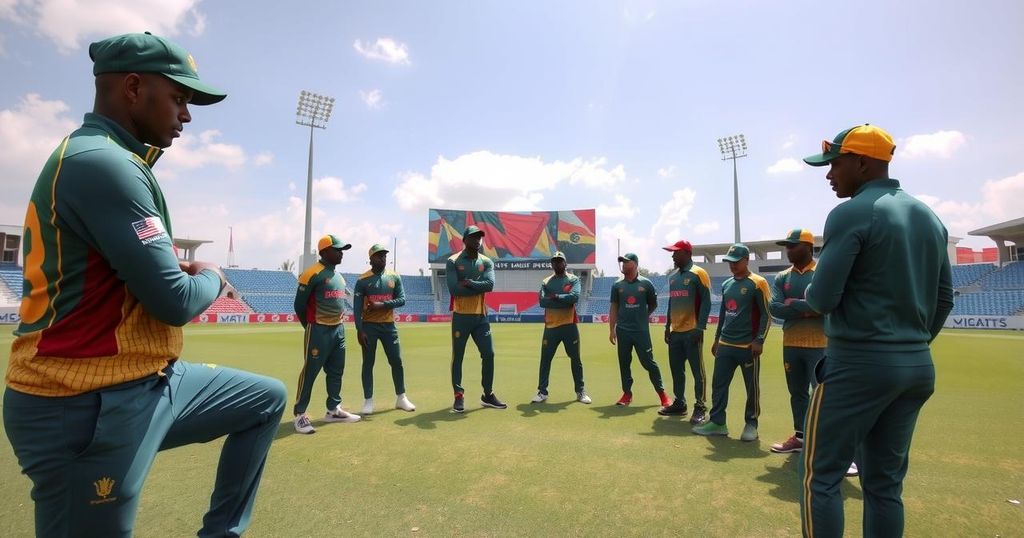Zimbabwe is competing against Gambia and Seychelles for qualification to the 2026 T20 World Cup, a process complicated by the USA’s recent rise in cricket. Direct qualifications have been granted to twelve teams, with the remaining spots determined through regional qualifiers, where Zimbabwe must navigate sub-regional challenges to secure their place.
Zimbabwe, an ICC Full Member, is currently competing against Gambia, ranked 95th, and Seychelles, ranked 91st, as part of the qualification process for the 2026 T20 World Cup. This competition arises from the configuration of the tournament, where 20 participants will battle for the coveted title, with only eight of those spots available through sub-regional qualifiers. The 2026 T20 World Cup will feature 12 teams that have already secured direct entries, while the remaining eight positions will be filled through qualifiers in Africa, Europe, and Asia. The Americas and East-Asia Pacific will contribute one qualifying spot each. A total of 108 ICC members will engage in this qualification endeavor, preparing for the tournament, which will occur in India and Sri Lanka. Among the teams that achieved direct qualification are India and Sri Lanka, owing to their status as hosts. Additionally, the first eight teams are those that successfully moved through the Super Eight qualifiers of the previous 2024 T20 World Cup. The allocation of two more positions for the best-ranked teams not qualifying for the Super Eights has also been stipulated, enhancing overall competitiveness. Direct qualifiers include India, Australia, England, West Indies, Afghanistan, South Africa, Bangladesh, and the USA. Pakistan, New Zealand, and Ireland have also made the cut based on their rankings. However, Zimbabwe’s hopes have been significantly impacted by the rapid rise of the USA cricket team, ranked at 17th. The USA’s remarkable performance in their World Cup debut, which included a historic victory against Pakistan, allowed them to secure a spot in the next edition, a slot that could have potentially gone to Zimbabwe, ranked 12th. Consequently, due to their failure to earn direct qualification, Zimbabwe must pursue their path to the 2026 T20 World Cup through the Sub-Regional Africa Qualifier B, taking place in Kenya. In this group, Zimbabwe will face formidable opponents including Gambia, Kenya (33rd), Mozambique (64th), Rwanda (63rd), and Seychelles. As Zimbabwe navigates this qualification process, there is an urgent need for them to perform exceptionally to secure their place in the tournament, a scenario underscored by their previous struggles to qualify over the years. For the latest updates on cricket, including live scores and match statistics, follow Wisden.
The article discusses the qualification process for the 2026 T20 World Cup, emphasizing the role of Zimbabwe as an ICC Full Member who is competing against lower-ranked teams like Gambia and Seychelles. It outlines the overall context of the tournament qualifications, the regions involved, and directly addresses Zimbabwe’s missed opportunities due to the rising capabilities of teams like the USA. This background signifies the importance of performance in cricket and the competitive nature of World Cup qualifications, along with recent changes and impacts within the ICC rankings.
In conclusion, Zimbabwe’s current participation in the T20 World Cup qualification process against teams such as Gambia and Seychelles highlights the challenges they face in securing a spot in the tournament. The impact of the USA’s emergence as a strong cricketing nation has reshaped their qualification landscape. Moving forward, Zimbabwe must leverage this opportunity in the Sub-Regional Africa Qualifier B to showcase their strength and determination for the 2026 World Cup qualification.
Original Source: www.wisden.com






